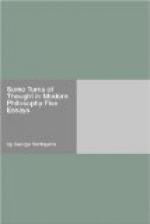III
Page 9. __All_ ideas must be equally conditioned._
Even the mathematical ideas which seem so exactly to describe the dynamic order of nature are not repetitions of their natural counterpart: for mathematical form in nature is a web of diffuse relations enacted; in the mind it is a thought possessed, the logical synthesis of those deployed relations. To run in a circle is one thing; to conceive a circle is another. Our mind by its animal roots (which render it relevant to the realm of matter and cognitive) and by its spiritual actuality (which renders it original, synthetic, and emotional) is a language, from its beginnings; almost, we might say, a biological poetry; and the greater the intellectuality and poetic abstraction the greater the possible range. Yet we must not expect this scope of speculation in us to go with adequacy or exhaustiveness: on the contrary, mathematics and religion, each in its way so sure, leave most of the truth out.
IV
Page 9. He cannot be aware of what goes on beyond him, except as it affects his own life.
Even that spark of divine intelligence which comes into the animal soul, as Aristotle says, from beyond the gates, comes and is called down by the exigencies of physical life. An animal endowed with locomotion cannot merely feast sensuously on things as they appear, but must react upon them at the first signal, and in so doing must virtually and in intent envisage them as they are in themselves. For it is by virtue of their real constitution and intrinsic energy that they act upon us and suffer change in turn at our hands; so that whatsoever form things may take to our senses and intellect, they take that form by exerting their material powers upon us, and intertwining them in action with our own organisms.




